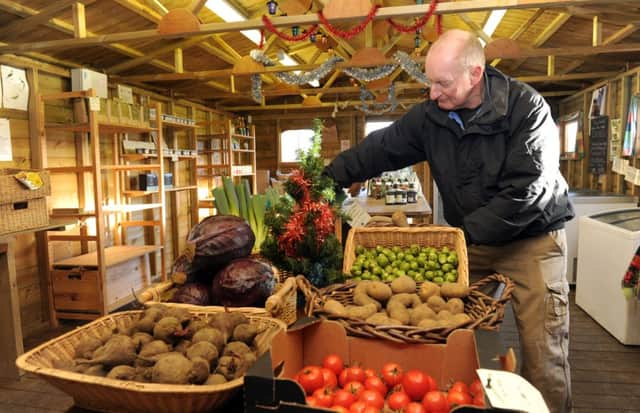Farm that provides all the seasonal trimmings


Hawthorn House Farm Shop on Weeton Lane in Dunkeswick between Harewood and Harrogate specialises in vegetables either growing their own or stocking others produce. Steven Snowden runs the 230-acre farm that is predominantly down to cereals and was until three years ago a fully organic farm.
“Our customers don’t necessarily come because we sell organically grown vegetables they come because they like what we sell. We have a loyal following of regular shoppers but we’re always happy to see new customers.
Advertisement
Hide AdAdvertisement
Hide Ad“We can’t classify our homegrown vegetables as organic now because we’re no longer certified with the Soil Association. We found that certification for such a small acreage – we grow just over half an acre of vegetables – was going to cost too much so we let our customers know that the vegetables we grow are grown to organic standards.
“We’re not trying to pull the wool over anyone’s eyes. There are no pesticides or fertilisers used in growing them.
“The rest of our excellent stock comes from Rosemary Wass’ Newfields Organics at Fadmoor in the North York Moors and from Arnold Warneken’s Goosemoor Organics at Cowthorpe near Wetherby.
“Our best time of year for the farm shop is actually during September and October when we have vegetables and a large array of soft fruit that we grow in polytunnels.
Advertisement
Hide AdAdvertisement
Hide Ad“We normally open Thursday, Friday and Saturday but we are also open on Monday and Tuesday this coming week for those who want some top quality farm produce on their Christmas dinner table.”
Steven’s parents Patrick and Elisabeth moved from Kirkby Overblow to Dunkeswick in the early 1950s. Having tenanted the farm initially when it was part of the Harewood Estate the Snowdens purchased it outright in 1996 from their last landlords the British Rail Pension Fund.
“When we first started here it was very much a mixed farm with beef cattle, sheep, pigs and a cow as well as an arable acreage. My father then decided to specialise in breeding fattening pigs. At our height we had 120 breeding sows that were predominantly Large White X Landrace with everything going to bacon.
“We mill and mixed our own corn for feed. It was a good system but we came to the stage where we had to either double the numbers to achieve the economies of scale we were looking for or get out so we chose the latter.
Advertisement
Hide AdAdvertisement
Hide Ad“We fattened pigs on contract for about five years eventually finishing with pigs completely when we made the decision to convert the whole farm to organic production around 1995-96.
“It was just when organic farming was picking up and grants were available to encourage conversion so we went into the Organic Farming Scheme. At that time we grew a lot of potatoes that we sold to Organic Farm Foods in Bathgate, Scotland.
“The organic potatoes went well for a while but when more growers entered the market the price went down and we decided it wasn’t working well enough so we downsized to grow only the amount of vegetables we could sell direct from the farm.”
The same experience was gained in growing wheat, beans and oats under organic methods. At first, the Snowdens were getting double the price they were receiving for a conventional crop but then the premiums went down for organic crops and the conventional wheat price went back up.
Advertisement
Hide AdAdvertisement
Hide Ad“In the end it purely came down to a practical decision. The margin between the returns we were getting for organic crops as opposed to conventional crops was of little difference and because we couldn’t control the weeds I was spending more time fallowing the fields than growing the crops.
“In hindsight we should really have had a livestock enterprise of beef or sheep as it seems the organic farms that work best are those that can rotate the fields around because of the livestock.”
Today’s arable acreage sees the Snowdens growing 80 acres of wheat, 30 acres of oats and 25 acres of beans. “This year we’re growing a German variety of milling winter wheat called Edgar that we’re hoping will go into Warburtons for bread making and our spring wheat is Mulika. Our oats are Mascani.”
Steven, like his father before him, always tries to respond as best he can to what the market demands but admits to the current world market being tricky to gauge. “It’s such a volatile grain market today that it makes it very difficult to plan ahead. Two years ago wheat was touching £200/tonne and this year it has been down to £100/tonne. It’s very unpredictable and that means you have to be adaptable to have a go at whatever makes money at the time.”
Advertisement
Hide AdAdvertisement
Hide AdThat’s exactly the way both Steven and Patrick have approached farming for the past 60-plus years at Hawthorn House Farm. They have moved out of one thing and caught on to the next throughout their history. Presently they grow 12 acres of short rotation coppice on contract that goes into the power station at Drax.
When Patrick first started farming here in the 50s during the days when there was a push for food he employed three full-timers and two part-time staff. It’s vastly different for Steven.
“Now I do all the work on the farm and if I can’t do it I bring in a contractor to help out. My father still helps out in the farm shop.”
Steven is married to Louise who looks after the farm accounts. They have two children – Rosie, 23, and Jack, 21.
Hawthorn House Farm Shop is open today and also Monday and Tuesday next week 10am-4pm.